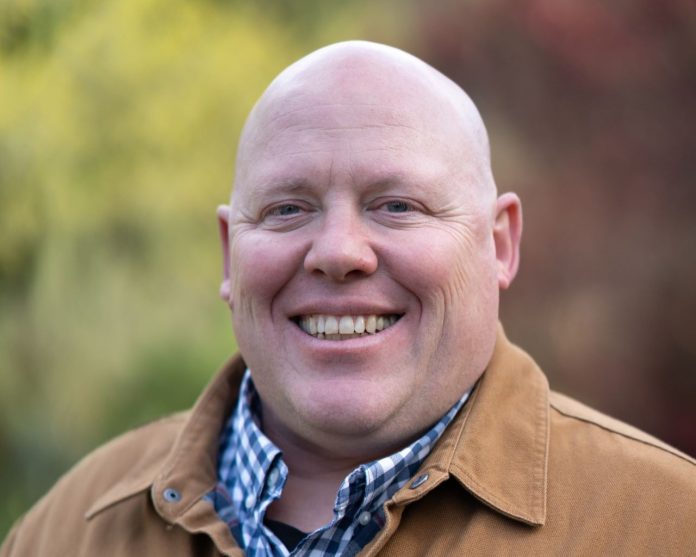
The Seattle City Council District 2 race just got a little more crowded, as Protec17 union steward Jamie Fackler announced his candidacy today. Fackler also works at the City of Seattle as a building inspector, building on decades of work as a carpenter.
D2, which includes Southeast Seattle, Chinatown-International District, and Yesler Terrace, has traditionally been a progressive stronghold, and this August’s primary looks to be cutthroat. The race already includes Seattle Office of Housing attorney Eddie Lin, karate teacher and small business owner Takayo Ederer, and skateboarder Adonis Ducksworth, who is Mayor Bruce Harrell’s transportation policy manager. Fackler brings the strongest union ties to the race, and he also is the most unabashed proponent of social housing.
While Fackler and his union backed Proposition 1A, which prevailed handily in the recent February election, Lin said he voted against it, and Ducksworth declined to divulge how he voted. Both Lin and Ducksworth claimed they’d work to support the Seattle Social Housing Developer now that the grassroots measure has passed and brought with it more than $50 million in expected annual revenue for the endeavor.
The social housing measure was opposed by Mayor Harrell and Seattle’s centrist city council majority due to opposition from big business, which balked at another tax — even one targeting only companies paying the highest earners in the city who make more than $1 million in individual compensation annually.
The Urbanist sat down with Fackler to hear more about what inspired him to jump in the race and opportunities he sees in office.
“The candidates who didn’t support social housing, again, is really a concern for me,” Fackler said. “It just seems real out of step with where we are as a city. I think what we need to do to make the city affordable is things like social housing, I think we need more than $50 million, right? I think there’s the capacity to do this program bigger.”
The other thing that Fackler stressed as an impetus to run was a desire to fight for the working class and help struggling people get back on their feet. He brought up is his experiences as a high school dropout. He was 14 when his parents divorced, which led him to struggle in school. But the community around him helped him get back on track and graduate and find a fulfilling career in the building trades.
“I know what it’s like to lose something and how hard it is to get that stuff back,” Fackler said. “I really see stuff that’s happening in this community — certainly on a federal level — that’s really gonna impact our city. I really want to fight like hell to save it.”
The value of urban density
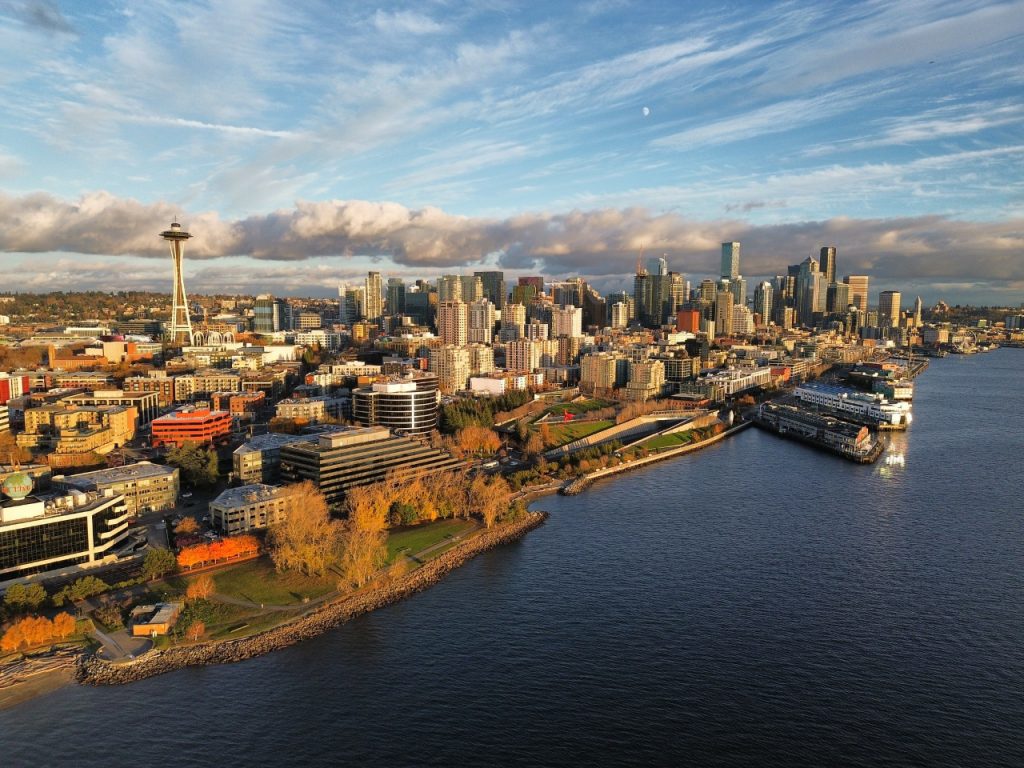
As a carpenter and general contractor, Fackler has built housing in Seattle firsthand, but he also said that, thanks to his father’s work, he grew up with an understanding of the importance of curbing suburban sprawl to protect natural ecosystems and the wild open spaces that he grew to love as a boy scout.
“[My dad] did a lot of work with land trusts up in Whatcom County and land swaps and preserving open space,” Fackler said. “He was a long range planner. So for me, growing up around that that really put value to me about preserve open space and how density and urban density really plays a role in protecting our environment. We live in such a unique and special place.”
While Fackler said he fell into the trades somewhat by accident, he developed a deep appreciation for the work and the meaning it brought.
“I really loved the work,” Fackler said. “And building homes for folks in the city and not in the suburbs, right? It’s where I’ve always been, and seeing it’s really important to be building in the city and developing in the city so that there can be more open space.”
Fackler’s pivot to being a building inspector rather than a builder came out of the 2008 housing crash and the toll the work was taking on his body.
“I really just fell in love with working with my hands, working with the trades,” Fackler said. “My body gave out to an extent from 20 years in the trades, and the last economic downturn was really devastating for my industry.”
Union organizing and resisting Trump
In the pandemic era, Fackler’s bargaining unit at work switched to a new union, Protec17, and they put out the call for new shop stewards. He jumped at the opportunity, seeing plenty of workplace safety issues to work on amid the Covid pandemic. Fackler quickly climbed up the ranks, including getting a delegate seat at the MLK County Labor Council.
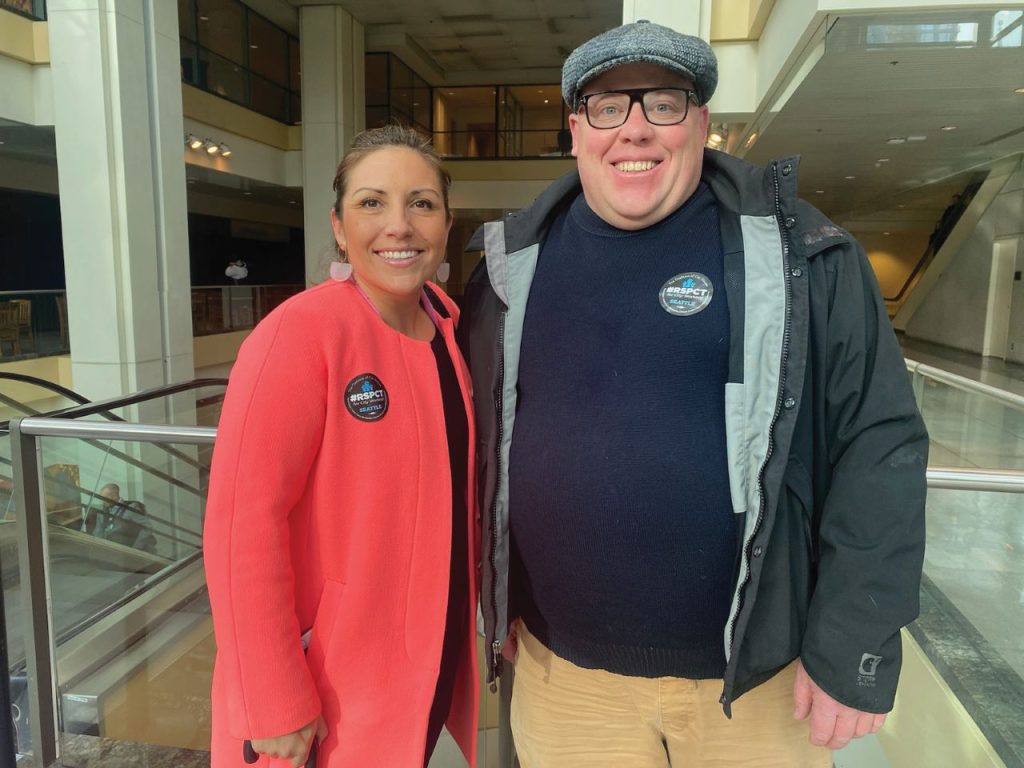
Fackler contends the solidarity that the labor movement emphasizes is a great foundation to build around to fight back against Trump’s right-wing authoritarianism and shredding of constitutional rights and norms of decency.
“For me, this is core to being a union member and a shop steward: standing up for each other, organizing, saying enough is enough,” Fackler said. “If people of conscience don’t stand up and say, enough is enough, then we’re complicit in this. I don’t agree with what’s coming. If I don’t do something about it, I’m complicit. I really feel compelled.”
Housing growth and averting a downturn
Fackler advocated for going big on Seattle’s 20-year growth plan, which has been dubbed the One Seattle Comprehensive Plan by Mayor Harrell. “I’d like to see a more ambitious Comp Plan,” Fackler said.
With his background in building, Fackler seemed primed to the risk of a major housing downturn right as Seattle was potentially seeing some progress in easing the housing crisis.
“I’ve been really disappointed in this Comp Plan process, and what’s been rolled out,” Fackler said. “There’s such a huge need. Displacement is real thing that needs to be considered. We’re on the tail end of development cycle, and it seems like things are about to be shut off here momentarily.”
Permitting reform and streamlining is another area where Fackler would like to see improvement and where he see opportunity to encourage more homebuilding. His department is set to lose its director with the departure of Nathan Torgselson, creating an opening for major changes at SDCI. But major changes would likely require buy-in and leadership from the Mayor’s office.
“I would love to see a department that brings the permitting together so that it’s easy, right?” Fackler said. “Development services where everything’s all teed up if you want to build an XYZ project.”
Fackler seemed wary of the push to add housing in industrial zones, exemplified by Council’s recent vote to rezone SoDo’s stadium district for upwards of 1,000 homes. He noted that Fort Lawton would be a far better place to put housing, given the proximity to the city’s largest park (Discovery) and amenities. Nonetheless, the City’s plan to add affordable housing on the decommissioned military base has been stalled out and beset with appeals from homeowner groups.
Safe streets
Fackler emphasized the need to prioritize road safety and target the most dangerous streets. He said crashes have altered his choices to get around.
“I used to live in Judkins Park and I used to commute by bicycle to the City until I got hit by a car,” Fackler said. “And that kind of spooked me a bit after that. And I was recently hit as a pedestrian on Rainier.”
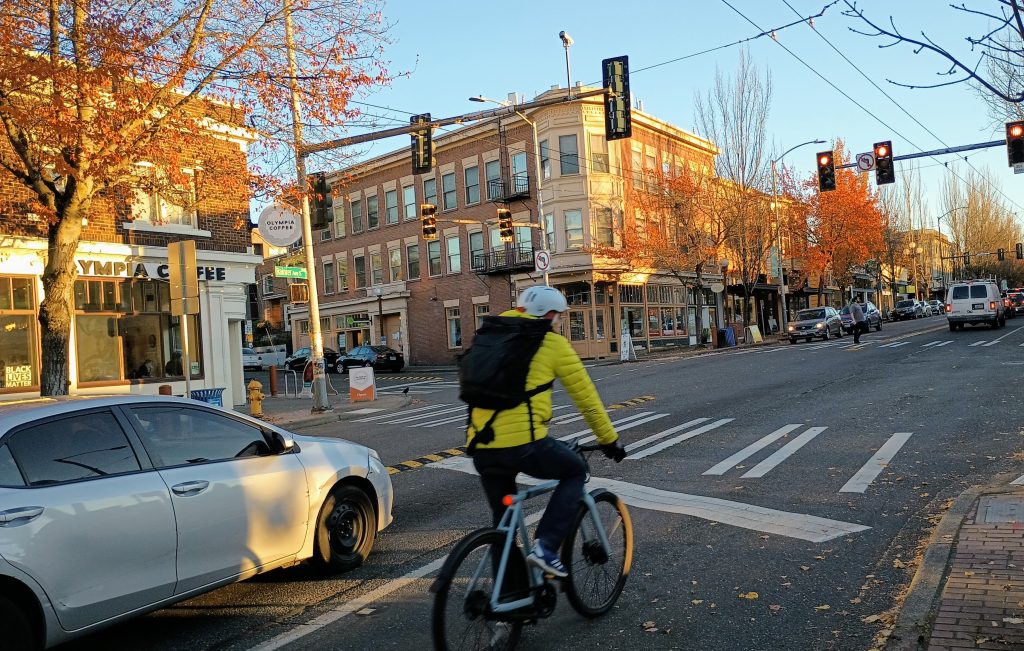
Streets like Rainier Avenue and MLK Way (both in District 2) have routinely been some of the most deadly and crash-prone streets in the cities — along with hot spots like Aurora Avenue N.
“I would be advocating for evidence-based — let’s stress the areas that have the highest rates of collisions,” Fackler said. “Let’s take care of that MLK group first. Let’s prioritize that.”
Seattle’s new transportation levy is set to tackle both Rainier Avenue and MLK Way, but past precedent suggests that the city will move more toward spot fixes rather than overhauls.
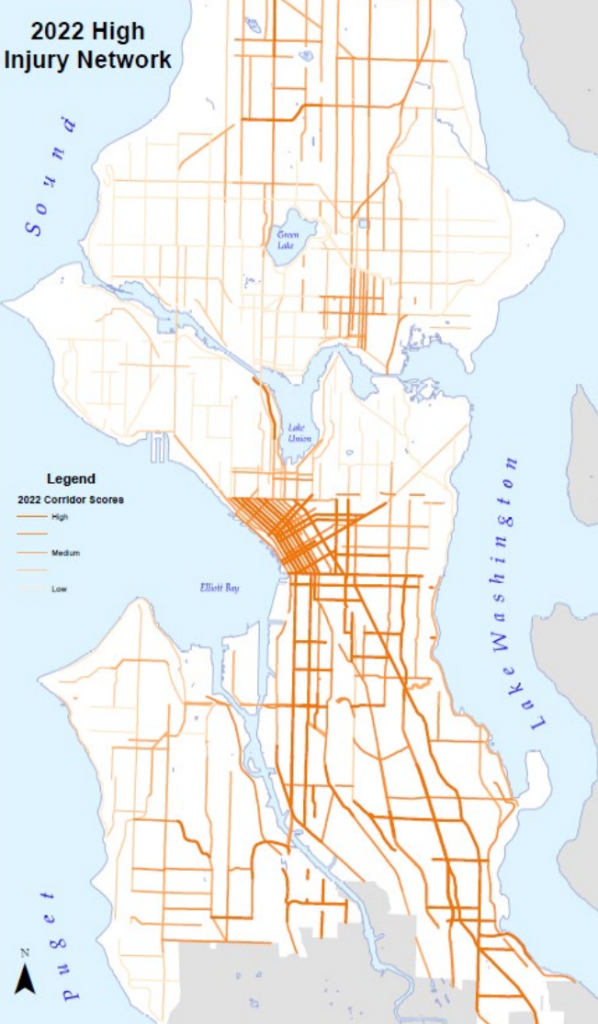
Avenues to collaborate and to advance progressive causes
Fackler said he anticipates having avenues to work with the mayor and council — even if more business-friendly centrists keep control. He noted everybody agrees about the need for public safety, even if there’s disagreement about approaches to achieve that.
“We need to take those wedge issues, and we need to turn them into ramps and bridges, right?” Fackler said. “We need to look for common ground.”
Fackler stressed upstream solutions and investing in the social safety net, as well as scaling up the City’s civilianized Community Assisted Response & Engagement (CARE) department. Stipulations in the City’s contract with the Seattle Police Officer’s Guild (SPOG) cap CARE at just 24 crisis responders. However, Rep. Shaun Scott (D-43rd, Seattle) had proposed state legislation circumventing that provision to allow for expansion. That bill died this session, but could be back next year.
As a union leader, Fackler underscored the importance of collective bargaining rights, but he did offer some criticism of the last SPOG contract, saying the City should have negotiated stronger accountability measures. He also noted that police officers aren’t allowed to strike and indicated they should be brought along willingly to new accountability measures and CARE expansion, which didn’t exactly suggest he was ready to play hard ball.
Fackler expressed much more openness to new progressive revenue sources than the centrist colleagues he would be collaborating with — in his first two years at least. He suggested a tax targeting CEO pay ratio and broader progressive tax reform to ease the relative burden on the working class.
“We have an incredibly regressive tax system in this state,” Fackler said. “Working families in Southeast neighborhoods have a higher effective tax rate that those in Laurelhurst or Queen Anne, right? We need to work to interrupt that. Let’s change that.”
Doug Trumm is publisher of The Urbanist. An Urbanist writer since 2015, he dreams of pedestrian streets, bus lanes, and a mass-timber building spree to end our housing crisis. He graduated from the Evans School of Public Policy and Governance at the University of Washington in 2019. He lives in Seattle's Fremont neighborhood and loves to explore the city by foot and by bike.


